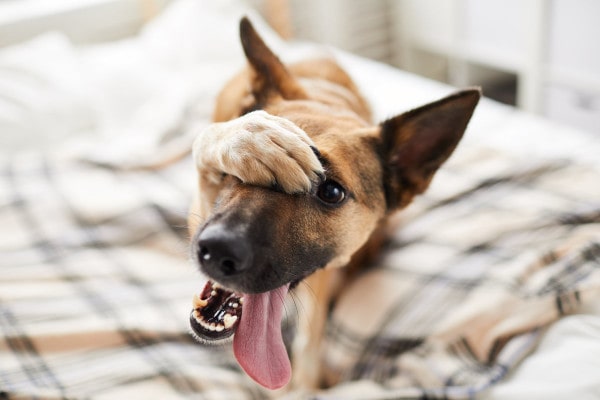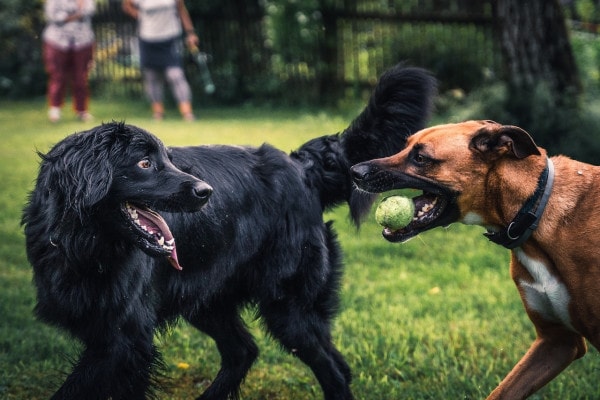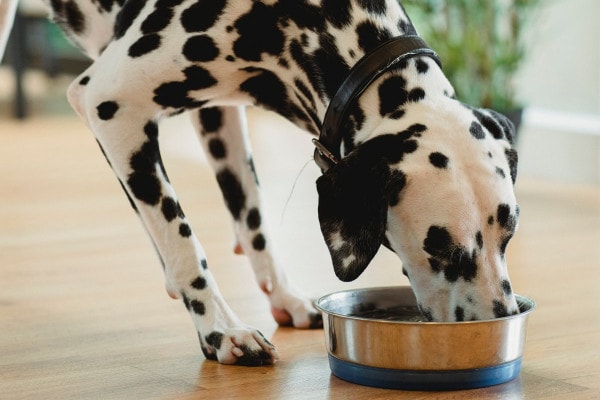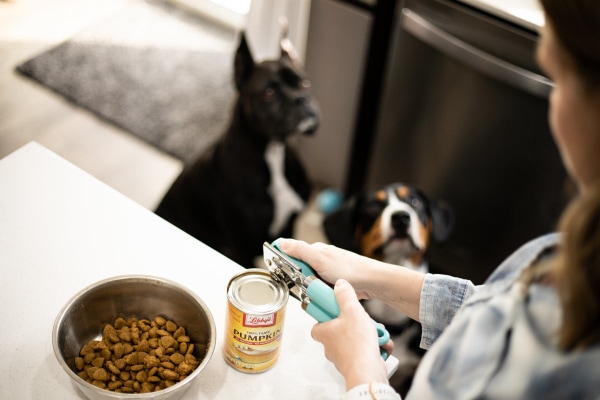At one point or another, most dog parents have found themselves thinking, “My dog has diarrhea but is acting fine. What should I do?” To help guide you, integrative veterinarian Dr. Julie Buzby explains why dogs may have diarrhea but still act fine, when you need to make a vet appointment, and how to help manage your dog’s diarrhea at home.

Diarrhea happens. That’s pretty much a given.
Sometimes it comes with additional symptoms like lethargy, vomiting, or abdominal pain that help you tell your dog is sick and a vet visit is in order. But there are also times where your dog has diarrhea but is acting fine. Those situations can be a bit harder to know how to navigate. Do you give it time or try a home remedy? Or should you still be calling your vet?
Diarrhea in a dog who is acting and feeling totally normal otherwise can definitely be a bit of a conundrum. Hopefully, the information I’m about to share will give you a better idea of what to do.
Why do dogs have diarrhea in the first place?
In order to better understand diarrhea, we need to start with a quick anatomy and physiology lesson. Your dog’s small and large intestines are responsible for, among other things, absorbing nutrients and fluid from the food your dog eats and passing the remainder of the intestinal contents (i.e. ingesta) out of the body as stool.
However, sometimes instead of having nicely formed stool, a dog will have loose or poorly formed stool (i.e. diarrhea). This may occur when:
- The intestinal cells secrete more fluid into the intestinal lumen (i.e. space within the intestines that contains the ingesta)
- The walls of the intestines become inflamed or eroded, which allows more fluid, electrolytes, and blood to enter the intestinal lumen
- Particles within the ingesta pull more fluid into the intestinal lumen
- The rate of passage of ingesta through the intestines increases (i.e. it goes through the intestines faster), leaving less time for excess fluid to be pulled out
What causes diarrhea in dogs?
Practically speaking, a variety of different diseases or scenarios can lead to any of the mechanisms of diarrhea that we just discussed. Some tend to make dogs sick. The dog may also be losing weight, vomiting, being a lethargic dog, or showing other symptoms. A few of the more common health issues that can fall into that category include:
- Inflammatory bowel disease (IBD in dogs), which tends to cause chronic diarrhea
- Some viral, bacterial, or fungal infections such as parvovirus
- Pancreatitis in dogs (i.e. inflammation of the pancreas which is often associated with eating fatty foods)
- Acute kidney failure in dogs
- Acute liver disease in dogs (e.g. hepatitis)
- Hemorrhagic gastroenteritis (HGE)

Why is my dog having diarrhea but acting fine?
But other conditions may lead to a dog who has diarrhea but is otherwise feeling fine. Some of the common culprits include:
- Dysbiosis (i.e. imbalance of bacteria in the intestines)
- Parasitic infection (e.g. roundworms, hookworms, coccidia, giardia, etc.)
- Dietary indiscretion (e.g. ingestion of foreign objects, eating garbage or spoiled food, consuming plants or toxins, etc.)
- Less severe bacterial or viral infections
- Changing to a new food or giving your dog a new treat or chewable toy
- Medications (e.g. non-steroidal anti-inflammatory drugs such as carprofen for dogs, steroids such as prednisone for dogs, antibiotics, or chemotherapy drugs)
- Stress (e.g. moving, boarding, company coming over, new pet in the house, etc.)—this is called stress colitis in dogs
And to further complicate things, some dogs with a diarrhea-causing condition might be acting sick. But other dogs with the same condition may have no other symptoms. For example, puppies with severe parasitic infestations may have significant anemia in dogs (i.e. low red blood cell numbers) or lethargy and may experience vomiting plus diarrhea. Yet, in a healthy adult with a smaller worm burden, the only clinical sign might be smelly watery diarrhea.
Plus, it is also possible for a dog suffering from diarrhea to start out acting fine but then begin feeling sick as he or she becomes dehydrated or the condition worsens. All in all, this means that diarrhea, while common, is far from cut and dried.
Should I be worried if my dog has diarrhea but is acting normal?
Understandably, this may make it difficult for dog parents to know how best to address their dog’s diarrhea. Luckily, the majority of cases of diarrhea in a dog who is acting fine are self-limiting. This means that they resolve on their own and often without any medical intervention.
However, as we have discussed, not all diarrhea is harmless. It could point to a more serious condition. And even dogs having small amounts of watery diarrhea can sometimes become dehydrated if the diarrhea persists for several days. This is why knowing when and how to intervene is so important.
Do I need to go to the vet if my dog has diarrhea?
Let’s take a closer look at the various types of diarrhea and how quickly you need to consider a vet visit in each case.
Watery diarrhea or diarrhea with small amounts of mucous
Typically, dogs with soft or watery diarrhea or diarrhea with a small amount of mucous in it who are acting fine can safely wait a day or two before being seen by a vet. This gives you a chance to try some home remedies to see if the diarrhea will resolve. If it doesn’t, or your dog gets worse, it is time to head to the vet.
Green or yellow diarrhea
While green diarrhea or yellow diarrhea can be shocking, they too are generally on the “ok to give it a day or two before bringing your dog to the vet” list if your dog is acting fine. However, if your dog is acting sick, or if there is any chance your dog could have gotten into rat or snail bait (which typically contain a green or blue dye), it is important to seek veterinary care quickly.

Black, explosive, or bloody diarrhea
On the other hand, if your dog has any of the following types of diarrhea, it is a good idea to make an appointment with your vet promptly. (Or if the symptoms are severe, consider heading to the urgent care or emergency clinic for an emergency vet visit):
- Black, tarry diarrhea (this could indicate upper gastrointestinal bleeding)
- Explosive diarrhea (this can be painful and may cause rapid dehydration)
- Bloody diarrhea (this could indicate hemorrhagic gastroenteritis or other causes of bleeding within the colon)
(When I refer to bloody diarrhea, what I mean is diarrhea with a lot of blood in it. Dogs with an inflamed colon may sometimes have a little streak of blood in the diarrhea. While still concerning, this small amount of blood typically caries less urgency than true bloody diarrhea.)
When in doubt, talk to your vet
I’ve tried to give you some general guidelines for when to call the vet for a dog with diarrhea who is acting fine. But I don’t want to downplay the importance of your pet parent intuition. If your gut says something is wrong with your dog, or you are concerned about his or her symptoms, don’t hesitate to reach out to your vet. He or she can help you decide if you should bring your dog in promptly or try some home remedies (which we will get to soon) for a few days.
What can I expect if I need to bring my dog to the vet?
Should you find yourself at the veterinary clinic, the veterinary team will probably start by asking questions about your dog’s symptoms, diet, vaccinations, etc. This information can sometimes help narrow down the list of common causes of diarrhea a bit. Then the vet will perform a thorough physical exam. While doing so, he or she will pay special attention to your dog’s hydration status and abdominal palpation and rectal exam findings.
Fecal exam and other testing
After gathering this information, the vet will discuss any diagnostics with you. Often, with a dog who has diarrhea but feels fine and has a normal physical exam, the only diagnostic the vet may recommend is a fecal test for dogs. (To help your vet out, please bring a fecal sample to the appointment if possible.) These fecal tests can help your vet rule out parasites and evaluate the stool appearance.
There are a variety of other potential tests (parvo test, blood tests for dogs, X-rays, ultrasound, etc.) that your vet could run for a dog with diarrhea. However, the fecal exam is a good place to start because checking for every cause of diarrhea in a dog who is acting fine usually isn’t necessary (and is often cost-prohibitive).
However, if your vet is suspicious of parvo, organ damage, toxin exposure, or other more serious causes of diarrhea, he or she may run some of the tests mentioned. And if your dog’s diarrhea doesn’t resolve with a few days of symptomatic treatment, or keeps coming back, more testing is often warranted at that point.
How do veterinarians treat diarrhea in a dog who is acting fine?
Based on the results of the physical exam and fecal test (and other testing if indicated), your vet will develop a treatment plan. If the vet uncovers a cause for the diarrhea (e.g. parasites), the dog may receive specific treatment for that problem (e.g. anti-parasitic medications). And if your dog is dehydrated, the vet may administer subcutaneous fluids for dogs. Or for more significant dehydration or severe diarrhea, the vet may recommend hospitalization for IV fluids and additional treatments.

In the past, an antibiotic called metronidazole was a popular choice for dogs with acute diarrhea. However, more recently veterinarians have been moving away from using it as frequently because it has negative effects on the normal intestinal bacteria and weak evidence to support its efficacy. This shift away from metronidazole is supported by a 2022 study demonstrating that nutritional management was superior to metronidazole in dogs with acute colitis (i.e. colon inflammation).
Therefore, supportive care is the mainstay of treatment for most cases of diarrhea in dogs who are otherwise asymptomatic. It typically involves probiotics, fiber supplements, and/or a bland diet for dogs.
How can I treat my dog’s diarrhea at home?
These same supportive care measures are things you can try out at home when you notice your dog has diarrhea. Let’s take a look at each one in more detail.
Bland diet
Many dogs who have diarrhea still want to eat, and this is just fine! Feeding small amounts of a bland diet frequently throughout the day can be a great way to soothe your dog’s GI tract.
Veterinary prescription diets that are highly-digestible and low-fat are ideal for dogs with diarrhea. These specially formulated dog foods promote healthy intestinal bacteria while meeting all a dog’s energy requirements.
But in a pinch, it is generally safe to feed your dog cooked chicken and white rice. This combination of food provides your dog with important nutrients while still adhering to the rules of a bland diet.
Most veterinarians recommend using boiled, skinless chicken and boiled white rice. But ground turkey, potatoes, and low-fat cottage cheese are also safe options. Keep in mind that you should not use any oils or seasoning to prepare your dog’s meal. And as with any time in your dog’s life, make sure to offer your dog plenty of fresh water.
Assuming your dog’s diarrhea resolves, you can typically make a gradual transition back to your dog’s regular food after three to five days of the bland diet (unless your vet instructs you otherwise).
Probiotics and prebiotics
There are multiple over-the-counter probiotic supplements that can be helpful for dogs with diarrhea. Probiotics are live bacteria that help maintain overall gastrointestinal health. And they provide competition for the harmful bacteria that can make themselves at home in your dog’s intestines. Many probiotic supplements also contain prebiotics (i.e. food for the helpful gut bacteria).
Fiber supplements
Adding fiber to your dog’s diet can also help resolve diarrhea. This is the case because fiber helps with stool consistency and movement of foodstuffs through the intestines. And fiber for dogs also promotes gut health by feeding the “good” gut bacteria.
While your dog’s food already contains fiber, it isn’t necessarily enough fiber to resolve diarrhea. This is where adding plain canned pumpkin for dogs to your dog’s food, or better yet, giving him or her a fiber supplement, can make a big difference.

Psyllium-based fiber supplements like Metamucil for dogs are a popular choice. The capsules or unflavored powered forms tend to be best (and safest). Typically, you would sprinkle the powder onto food once or twice a day. But your veterinarian can advise you on how much Metamucil to start with and how often.
Safety note: Do not give your dog pumpkin pie filling as it may contain harmful spices or the artificial sweetener, xylitol, which is toxic for dogs. And always read the label of the Metamucil to ensure it does not contain xylitol either. The flavored powder, gummies, and wafer forms of Metamucil are particularly likely to contain xylitol so you should avoid them.
Can I give my dog Pepto Bismol for diarrhea?
As a veterinarian, I do not recommend giving your dog Pepto-Bismol for dogs or any other human medications for diarrhea such as Imodium® (loperamide) without consulting your vet. Many veterinarians share this point of view. There are several important reasons why this is the case.
Pepto-Bismol can turn your dog’s stool black, be mistaken for a foreign body on X-rays, increase the risk of GI ulcers, and interfere with other medications.
And motility modifiers like loperamide can be dangerous if a dog’s diarrhea is due to an intestinal obstruction or toxins that need to leave the body.
Therefore, I prefer that these human anti-diarrheal medications be reserved for situations where the veterinarian feels they are warranted rather than being something my clients try at home on their own. Yes, you will find plenty of online articles that suggest trying Pepto-Bismol for dogs or Imodium® (loperamide). But I still maintain that the safest approach is to avoid them unless your vet advises you otherwise.
Try home remedies but talk to your vet if you are worried
Diarrhea is very common in dogs. But thankfully, while unpleasant, diarrhea is often self-limiting in dogs who are otherwise asymptomatic. Therefore, if you have a dog with diarrhea who is acting fine (and doesn’t have explosive, black, or bloody diarrhea), you may be able to try some supportive care at home. However, if your dog’s diarrhea doesn’t resolve within a day or two, or he or she starts acting sick, be sure to contact your veterinarian promptly.
Additionally, if at any time you are worried about your dog, please don’t hesitate to consult your veterinarian. It is much better to call and find out that you can stay the course with supportive care than it is to wish you had called earlier.
Hopefully, your dog’s diarrhea will all be a distant memory soon. And one that doesn’t repeat itself for quite a while!
If your dog had diarrhea but was acting fine, did it go away with supportive care?
Please comment below.


Hello,
I am having trouble narrowing down what is causing my 7 year old Cocker Spaniel’s soft stool with lots of mucus which has now turned in to distress with mucus. To start from the beginning my dog has been on The Farmer’s Dog for almost 4 years now. Each month she gets Turkey, Chicken and beef (which I recently switched to pork) I was feeding her once a day because she was never hungry or would eat in the mornings. But about a year ago she was having a lot of accidents at home so the vet suggested I feed her twice a day now as she is getting older and maybe have a more sensitive stomach. I feed her twice a day now and the accident stopped. But when I feed her turkey the portion seems much bigger than the rest and her poops have always been bigger. That’s variable 1. Variable 2 my boyfriend last week came back from Trader Joe’s with these Salmon Jerky treats that smelled very very strong I let him give her some even though I was hesitant. Around that time she started having loose stool’s so after a couple days of loose stools I threw the treats away. Then last week she was eating her dinner which was turkey and that night around 4am she woke me up to poop we go outside and immediately she poops very soft stool with a lot of diarrhea and the stops on the grass and throws up her turkey food that didn’t look digested at all. Then I call the vet and mention all the mucus and she tells me her gut may be a little off and to try fort-a flora probiotic so I order it the same day and give her a pouch with her dinner. That’s variable 3. That same night at 3am she wakes me up and the same thing except now it’s really soft stool but still mucus. So I call the vet and ask to drop off a fecal sample which I did yesterday and she said to give her a bland diet. So last night I cooked her boiled chicken and white rice with the probiotic and she pooped diarrhea again this afternoon. I am so lost on what is going on with her. 🙁 she is eating, acting normal, playing, drinking water.
Hi Tatiana,
I am sorry your girl is experiencing this ongoing issue with diarrhea and vomiting. Unfortunately, without examining her myself, there are just too many possible causes to make specific conclusions or recommendations. It sounds like it may be time for more in-depth investigation. I encourage you to schedule an appointment for your vet to do an exam and they can decide if blood work or x-rays are needed as well. GI issues can be tricky to diagnose but I hope you can get some answers quickly and start the appropriate treatment. Wishing you and your sweet girl all the best of luck. Feel free to leave an update and let us know how things are going.
I hope you see this my Lexi has the same issue!! Please check for worms have them to a fecal test also please buy the provable paste and administer 3 times daily! Find the right one for your pets weight!! It’s been a life saver for Lexi. I’ve also invested in a nutritionist which is not expensive! I am now cooking her food today she started having very watery poop. We took her to the vet they gave her paste and another med for diarrhea. Definitely start with the fecal and test for gardia
Hi Christa,
I am glad you have found what works for Lexi! Thank you for sharing this great advice and information!
I recently went on a week-long vacation during which my dog, Clancy, who I rescued 2 months ago, stayed with my parents and their dog, Gus. I was told Clancy is an about 2 year-old blue heeler/Carolina dog mix, and has been healthy so far. On the last day of my trip, he began having diarrhea, though my parents did not feed him any new foods, table scraps, etc., and they did not see him get into anything outside. I had him do a 12 hour fast, during which his diarrhea was liquidy (I expected this as I was only letting him drink water). I then began feeding him plain rice, boiled chicken, and boiled sweet potatoes for 1 day, and he had 1 soft-serve like bowel movement. I thought he was improving, but he just had another episode of watery-light brown stool (his stool has not and does not contain mucous, blood, or appear green/yellow). I’m not sure what to do as he has no other symptoms aside from being somewhat less energetic than normal (I expect this as having diarrhea is no fun for anybody). To my knowledge, he is UTD on vaccinations, and has no known health problems. Should I attempt other home remedies (plain Greek yogurt, cottage cheese, probiotics), or seek vet care? Thanks!
Note: my parents’ dog is asymptomatic and was with Clancy the whole week. They are well acquainted and spend a decent amount of time together as I am very close to my parents. I’m not sure if Clancy’s diarrhea is a stress response, but shouldn’t it have resolved if it is?
Hi Brenna,
I am sorry Clancy experienced these worrisome GI issues while staying with your parents. I definitely think it’s time for a visit to your vet. It would be good to rule out things like parasites before assuming this was a stress response. Stress diarrhea is definitely a possibility and usually resolves after a few days. But occasionally the bacterial balance in the GI tract is so badly disturbed that it can warrant a course of antibiotics to get things under control. I am not sure if Clancy is to that point yet and without examining him myself it is hard to make specific recommendations. I do like to use probiotics and specialty GI foods before moving on to medications, but your vet will have to determine what the best course of action is for your pup’s specific medical needs. Hoping all is well and that Clancy was able to make a full recovery. Feel free to leave an update if you have a chance. Best wishes!
We have a 5 month old cavalier King Charles’ puppy, who started exhibiting signs of soft. Serve stool and then it got greasy as it progressed… She was on Royal Canin food for puppies. And we ended up giving her metronidazole at the suggestion, the vet.
This was after having a fecal sample sent out and tested for parasites, which all came back. Negative… Then we had another fecal test sent out to search for viruses and that came back. Negative…. We also had in house blood work that was normal with the exception of the protein levels were just barely below normal.
Her only symptoms so far are that she has diarrhea when she poops. And she’s not gaining any weight which are both serious…
The vet suggested I switched her to Purona HA food…. They also wanted us to switch it cold Turkey because they did not want cross-contamination between regular food and hypoallergenic food to maybe cancel out the trial. So of course, she has diarrhea. Probably from going cold turkey onto a new food.
She’s only eating the food for her dinner and treats and gets one probiotic in the AM Sprinkled on her food….
We are really at a loss. As for what to do next, she is now on day. Seven of her veterinarian special diet but is not getting firm stool at this point.
Still no wait gain either. It’s anyone. Has any ideas to please help me if this is happened before or something. I’m missing I would love to hear.
Hi Sandy,
I am so sorry your puppy is having issues with chronic diarrhea. It sounds like your vet has done just about everything to try and get some answers and the cause is still a mystery. Without playing a personal role in your pup’s medical care it is hard to make specific conclusion. Although I will say the Cavalier breed is known to have problems with a variety of genetic issues. It makes me suspicious there could be more at play than we realize at this point. This could be a good time to schedule a consultation with a specialist. Hoping you will be able to get some answers and find the best treatment for your little girl. Wishing you all the best of luck!
she ended up having EPI, which we had blood tested at Texas A&M… We now put enzymes on her food. Whenever she eats in order to keep her healthy and she has gained weight.
Hi Sandy,
I am glad you were able to get a diagnosis and start treatment. Thank you for the update! Wising your girl continued success and many happy years ahead.
Sharing because our experience was a bit different..
Miley’s diarrhea stool was unusual in that it was a normally formed (firm no residue) stool followed by watery diarrhea in the same stool (same squat).
Not sure if it is related, but it occurred post anal sac expression and Miley was asymptomatic in all other regards with no dietary changes to note. (FYI: she normally has 2 small stools daily)
FYI: I do her anal expressions at home and have done so her whole life (12 yrs), so I was surprised she reacted this time. Note: I realize correlation is not causation, so there is a chance the unusual stool was just a coincidence.
Stool Progression:
1st day – 1) normal firm (segments & no residue) + watery diarrhea following in same squat, 2) soft formed (moist log) + some liquid, 3) small soft formed (moist log)
2nd day – 1) more normally formed (long slender log shape holding form), but slight mucous covering, 2) small and soft formed log shape (today is not over yet)
We have been monitoring her closely and since she seems to be improving, we are continuing with her regular diet which includes Hills K/D plus 2TBS of 100% pumpkin with each meal.
Background: Miley is a retriever of 60lbs, with very early-stage Kidney issues, and takes antigen shots for allergies
Hi Sherri,
Thank you for sharing your experience with our readers. I am so glad your pup is doing better and hope she will continue to improve. Wishing you and Miley nothing but the best!